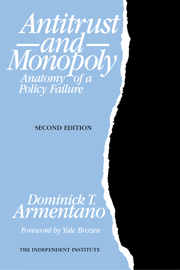The economic inefficiencies associated with antitrust law enforcement are now generally acknowledged. The regulation of mergers and acquisitions hampers the efficient reallocation of corporate assets. The antitrust regulation of product prices and innovation (as in the recent Microsoft case) protects less-efficient business competitors and harms consumers. A century of antitrust litigation—both public and private—confirms that the laws restrain the competitive process and make economic activity less efficient.
Economic issues aside, the antitrust laws also interfere with commonsense notions of liberty and justice, as Adam Smith remarked in The Wealth of Nations. Pro-antitrust economists never tire of citing Smith’s famous condemnation of price fixers: “people of the same trade seldom meet together . . . but the conversation ends in a conspiracy against the public, or in some contrivance to raise prices.” But those same economists rarely acknowledge that Smith immediately went on to assert that “it is impossible, indeed, to prevent such meetings, by any law which either could be executed, or would be consistent with liberty and justice.” Smith, a professor of moral philosophy, was opposed to antitrust law on practical and ethical grounds.
How do antitrust laws interfere with liberty? All the important antitrust statutes (Sherman Act, Clayton Act, Federal Trade Commission Act) regulate or prohibit purely voluntary or consensual business activity. For example, free-market monopolization implies that consumers choose freely to support only one supplier of some product or service. Free-market prices—whether they are described as discriminatory, or predatory, or collusive—are all determined through voluntary agreement and exchange. Mergers involve voluntary acquisitions of stock or assets. Tying contracts or exclusive dealing agreements are voluntary arrangements to purchase one good and forgo the purchase of another. Since liberty (in a business context) implies the natural right to make any agreement to trade legitimately owned property on any terms mutually acceptable, then antitrust law must interfere with liberty.
Microsoft Case
Consider the recent Microsoft antitrust case. The software company clearly has a property right to its software. It has a property right to license (or not license) its software to any PC manufacturers on any terms mutually agreeable. It has a property right to integrate its Web browser, Internet Explorer, into its Windows 98 operating system. And it has a property right to prohibit any licensee’s deleting any part of its Windows operating code. The federal government’s and the states’ attempts to regulate all these peaceful activities (and more) are not only irrational but clearly invasive of liberty and property rights as well.
The antitrust suit against Microsoft is also absurdly unjust. Microsoft is the world’s premier software corporation. It earned its market position by innovating a user-friendly operating system at minimal cost to the consumer. And rather than “restrain” trade, it has licensed its operating system to hundreds of PC manufacturers here and abroad. That it competed vigorously for market share cannot be doubted; but more important, it committed neither force nor fraud in its commercial activities. Yet for all this, it was rewarded with massive competitor envy and a decade of legal harassment from both the Federal Trade Commission and the Antitrust Division of the Justice Department.
Antitrust and the Rule of Law
Substantive abuses of liberty and justice occur with antitrust enforcement because owners of property (or trustees standing in for owners) are prevented from engaging in peaceful trade and exchange. But there are also “procedural” difficulties with antitrust regulation. For example, antitrust case law is so inconsistent that it is almost impossible to know from one case to the next which business practices are illegal and which are not. “Predatory prices” are illegal, but how low must prices go (and for how long) before they become predatory? In a “monopoly” case, how will the relevant market share be determined and what percentage of the relevant market will the court determine is monopoly? Mergers and tying agreements are illegal if they “substantially reduce competition,” but no Congress or court has ever clearly defined that expression with any precision-nor could they. Corporations and businesspeople indicted under antitrust regulation can only discover after the fact if they have violated antitrust law. This legal subjectivity is the major reason why those accused of antitrust violations settle their cases pretrial or with a consent decree.
The laws are also inherently discriminatory. In the Microsoft case, for example, the company was accused of entering into exclusive dealing agreements with PC manufacturers; it was also accused of refusing to allow PC manufacturers to delete the Web browser from Windows 98. Yet many of Microsoft’s competitors employ similar exclusive agreements with manufacturers, and many refuse to allow a licensee to delete any part of their proprietary software code. If the court rules against Microsoft, the company will have to change those practices-but its competitors will not. They will be perfectly free to engage in the very activity explicitly forbidden to Microsoft. If you think that this is unfair (as you should), remember that this is antitrust. As the judge in the 1953 United Shoe Machinery case put it: it was morally acceptable for the court to impose discriminatory requirements on the defendant, United Shoe Machinery Corporation, and not on its competitors since United’s unique efficiency already put it in a class by itself.
Over 100 years of experience with antitrust regulation confirms Adam Smith’s prediction that the laws are inherently abusive of liberty and justice. When our legislators gain the moral courage to repeal the vast antitrust apparatus, both economic performance and individual liberty will be expanded greatly.
The Immorality of Antitrust Law
This article is reprinted with permission from The Freeman, August 1999. © Copyright 1999, the Foundation for Economic Education.
Dominick T. Armentano is a Research Fellow at the Independent Institute and professor emeritus in economics at the University of Hartford (CT).
Antitrust, Competition, and MonopolyBusiness and EntrepreneurshipEconomyFreedomGovernment and PoliticsLaw and LibertyPhilosophy and ReligionPolitical TheoryRegulation
Comments
Before posting, please read our Comment Policy.








